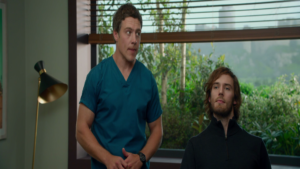Some Positive Aspects of “Me Before You”
 Given that I am approaching my 33rd year as a quadriplegic, I was immediately interested in Me Before You when I first saw a preview of it in a theater a few months ago.
Given that I am approaching my 33rd year as a quadriplegic, I was immediately interested in Me Before You when I first saw a preview of it in a theater a few months ago.
My initial reaction was similar to many others with disabilities: Why wasn’t an actor with a disability cast in the lead role? But I felt that I couldn’t make an informed decision until I read the book and then saw the movie. Now that I have done both, I want to offer my perspective.
Many people with disabilities are extremely angry about the movie and even protested it because it results in the lead character, Will Traynor, choosing to die. His notion that dying would be better than living with a disability is anathema to many in the disability community who feel this sends a negative message to society that a disabled life is not worth as much as a nondisabled life.
I can understand why so many people with disabilities have this view, but writing off the whole movie as terrible because of the right-to-die issues ignores positive aspects of the book and the movie that actually are, in my opinion, beneficial to those of us with spinal cord injuries.
In 1983, the year of my injury, I never could have imagined going to a movie theater with accessible seating and watching a blockbuster movie based on the life of a quadriplegic along with an audience of mostly nondisabled people. Heck, I didn’t even know what a quadriplegic was when I was injured. So a movie that deals with autonomic dysreflexia, shows a shower chair, includes a scene depicting the frustration and embarrassment of getting stuck in the mud, dealing with discriminatory treatment in restaurants, having awkward relationships with people who don’t know what to say or do or even whether to shake your hand, and friends who disappear over time because you are not the person that you once were, can’t be summarily dismissed.
These are all situations contained in the film and the book and, in my view, are depicted and written about in a very realistic fashion. The relationships are also quite realistic.
realistic.
There’s the close relationship with Nathan, the caregiver who understands Will probably better than anyone else. The mother who completely withdraws and worries all the time. The father who wants the best for his son and feels like he is just fighting a losing battle with his wife. And, although Will’s family is wealthy, he lives in the rural countryside, where he is completely isolated because there are no sidewalks, no curb cuts, or public transportation. He is completely dependent on others to get around and to accomplish his activities of daily living.
Embarrassment of having to be fed in public and dealing with people staring at you when you have the guts to go out on the dance floor at a wedding and spin around and have fun is very real. I have lived through every one of these experiences. To me it was liberating seeing them captured on the big screen.
There is no doubt that Will falls in love with Lou and that she falls in love with him. In a realistic way he expresses how he wishes he could be physically involved with her as he remembers being involved with other women before his injury, and not being able to do that with and for her makes him feel like he is failing her.
Ironically, her relationship with her athletic boyfriend is quite superficial. With Will she has an inner peace and a feeling of love that goes beyond the physical. Will admits that she makes him happy. He admits that he loves her. But because he can’t live the way he used to, he feels it won’t ever be enough and he will wind up being a burden on her. Their love for each other is not enough for him to change his mind about dying.
I didn’t want a cliché Hollywood ending where there is a fancy wedding and Will struggles out of his wheelchair to begin his marriage standing, but I truly did want Will to give it more time.
I feel like he set an arbitrary deadline and then, no matter what, was going to stick to it. After being injured for approximately two and a half years, he set his six-month deadline and because things didn’t go back to the way they were, he wanted to end his life. He was comfortable with his decision and felt like he gave Lou a better life. And that was enough for him.
I support consumer-directed care, and with that in my view comes the ability to decide how to live one’s own life, whether you are disabled, or sick with cancer or another disease. Each and every one of us has different life perspectives, goals, relationships and supports. But if I had to decide three years after my injury whether I wanted to live or die, I think I would have fallen closer to the latter rather than the former.
When I was in rehab after my injury I expressed a desire to end my life. And there have been times since then that were very dark, and given an opportunity I might have made that choice. But certainly three years after my injury I never could have imagined finishing college, going to law school, having a phenomenal job, living in an accessible place and meeting an amazing man who I would ultimately marry.
My life is certainly not what I envisioned it would be back when I was 16. But can any of us envision what our life will be like in the future? We don’t have any control over what will happen to us. But we do have control over our decisions about how we treat the situations and the challenges we are dealt. And I chose to live.
So that is where I fall in my opinion of the book and the movie. I am glad the author wrote the book and the screenplay. I am encouraged that the topics of love, quality of life, and realistic aspects of living with a disability are part of an active debate going on around the country on message boards and comments after a variety of articles that deal with all aspects of this issue.
We can wish for a different outcome for Will, or be satisfied that he made the choice he wanted. While it is fiction and Hollywood, this thought process is real. Our society is better for having this conversation and thinking about what it means to you personally. Any opinion on this subject should not be taboo; it is personal to each individual.
So while I wish that Will had taken more time, embraced the love of Lou, and found it fulfilling enough to want to live, I wouldn’t want anybody telling me how I should live my life. To me, that means respecting my choices. I am in control of that.
So read the book and watch the movie and make your own decision. Maybe the next movie will have a disabled actor and continue to deal with issues that those of us with disabilities confront every day. Don’t make snap judgments about the movie or the book without some thought. The movie and the book are worthwhile endeavors. You may feel differently, and that is your choice. You are in control of that.

